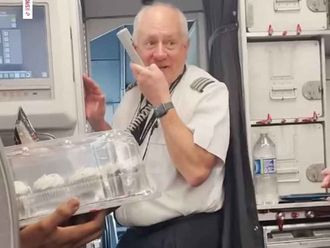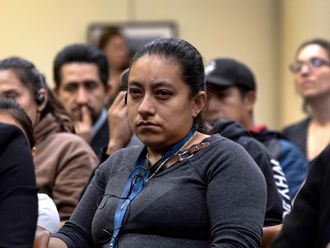Moore, Oklahoma: Curtis Carver has every intention of rebuilding from scratch the house he lost in Monday’s powerful and deadly hurricane that devastated this Oklahoma City suburb.
But first, the construction worker and 20-year veteran of the US Marine Corps, who spent two years on active duty in Iraq, wants to recover his memories from the rubble - and law enforcement is getting in the way.
“My pictures. That’s all I want - my pictures,” he said Tuesday while cooling his heels and suppressing his anger at a road block where a police officer politely but firmly denied him access to the disaster zone.
Other residents could enter with a valid proof of address, and many did, toting out by foot whatever they could in bags and luggage of all shapes and colours to their cars parked a few kilometers away.
But Carver’s house, in the vicinity of Southwest 14th Street and Santa Fe Avenue, was in an area deemed by authorities Tuesday to be still too hazardous to enter, although he did get a glimpse of it Monday evening.
“It was my home, my kids’ home,” said Carver, a 38-year-old father of two, wearing a camouflage jacket over an Oklahoma T-shirt. “Now it’s gone. There’s nothing left. It’s a pile of sticks, and they’re keeping me away.”
“It was dead in the middle” of the tornado’s 27km trail of destruction that claimed at least 24 lives, including several children, he added. “It was a target.”
Carver’s 10-year-old son and six-year-old daughter luckily escaped harm because his aunt had taken them to a doctor’s appointment. He himself was at work in Tulsa, a two-hour drive away.
On the fringes of the tornado’s path, evidence of the twister’s daunting power to destroy was staggering.
Most of the widely scattered debris consisted of splinters of wood never more than 30cm long, as well as fragments of particle board and chunks of insulation. Bigger objects were few and far between.
Here and there were touchingly personal items: a bicycle wheel, a baseball mitt, a golf ball, a red Christmas stocking, a CD compilation of Christmas songs with the name Kim written in felt pen, a black wig.
Whatever cars and pick-up trucks escaped being flung into the air like toys by the fast-moving wind funnel were splattered instead with dark red Oklahoma mud and pockmarked with dents inflicted by hailstones.
Along Santa Fe Avenue, utility poles that snapped in the 320km per hour winds stretched across the pavement like fallen soldiers. Pedestrians tip-toed around the wires, which no longer carried electricity.
What few trees stood amid Moore’s flat cityscape were shorn of their tops.
“This is a war zone,” said Carver, who deployed in the frontline Iraqi city of Fallujah as a sergeant in a Marine Corps general engineering unit. “Even if there’s not a big (bomb) hole in the ground, it’s a war zone.”
Helping inhabitants recover belongings were orange-shirted employees of Home Depot, a national building supply chain whose local outlet is doubling as the command post for search and rescue teams and relief workers.
“We were in Dallas for a meeting and we thought this was a better place to be,” said one of the volunteers, Michael Albrecht, who hails from Atlanta, Georgia, where the company is headquartered.
He and his comrades said they had helped residents unearth official paperwork such as passports and tax declarations, but also “a lot of collectables” such as Star Wars memorabilia and part of a coin collection.
Clothing was also highly coveted. While bedroom dressers might have been broken into pieces, their textile contents were invariably intact and ready to be worn again by their owners.












